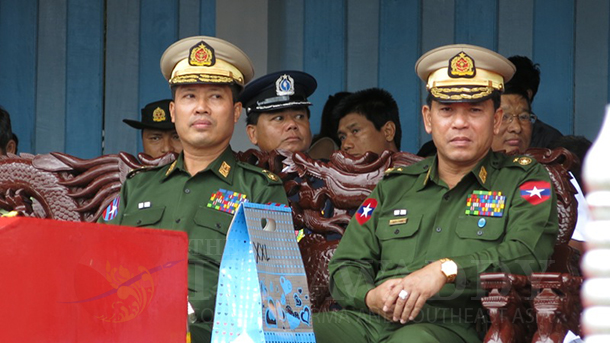RANGOON — President Thein Sein has appointed Burma Army general and Deputy Home Affairs Minister Maung Maung Ohn as the new chief minister of Arakan State, a decision that was announced in the state’s legislature on Wednesday, Arakanese lawmakers said.
The Arakanese politicians said they would try to resist the appointment in the coming days as they object to the conflict-torn state being governed by the military.
On Friday, the President’s Office announced that Gen. Maung Maung Ohn was appointed member of the Arakan State parliament, a step that turned out to be part of the appointment procedure. An urgent legislative meeting was then called for Wednesday, when his appointment as chief minister was announced.
“At parliament today, the chairman of parliament read a letter from the president, in which he proposed that Gen. Maung Maung Ohn becomes chief minister,” Arakan National Party (ANP) lawmaker Saw Nyein said.
“If there are objections [to the appointment] lawmakers need to notify [parliament] by June 27. Gen. Maung Maung Ohn will become the chief minister if there is no one disagreement.”
He added that Maung Maung Ohn was present in the state legislature during the four hour session.
The government announced last week that Arakan State Chief Minister Hla Maung Tin was “allowed to resign.” It remains unclear why the lawmaker of the ruling Union Solidarity and Development Party (USDP) stepped down after four years in charge.
As Deputy Minister of Home Affairs Maung Maung Ohn led the government commission that investigated the Sittwe riots in March, when Arakanese Buddhist mobs attacked international aid offices. The probe concluded that the state government had been slow to react to the unrest.
Under the 2008 Constitution, the Burma Army controls three ministries, Defense, Home Affairs and Border Affairs, and generals are in charge.
Arakanese politicians, who have long been calling for greater political autonomy for their region, said they viewed the appointment of a general as chief minister as a throwback to the days of military rule in Burma.
“To be frank, we feel the president wants to put our region under military control. By doing this, our people will not get any benefit from the democratic reforms,” Saw Nyein said. “Our people are not happy; they say they want an educated person from our ethic group to be chief minister.”
He said Arakanese lawmakers, who hold 18 out of 34 state parliament seats, would formulate the grounds for objecting to the appointment, adding, “We need to be very sure and find out what Gen. Maung Maung Ohn has done wrong in the past if we want block him in parliament. We are still researching his background and we will raise our objections.”
Khin Maung Gyi, ANP central committee member, said, “We can’t agree to let a person who was not elected by the people run our region. We want the government to select those who were elected.”
The Arakanese conceded, however, that there was little they could do to oppose the appointment.
Under the military-drafted 2008 Constitution, which centralizes executive powers over the divisions and ethnic states with the government in Naypyidaw, the president has the authority to appoint a region’s chief minister.
In 2012, Arakan State was plunged into a crisis after waves of deadly inter-communal violence broke out between Arakanese Buddhist majority and the Rohingya Muslims. The Rohingya, a stateless minority of around 1 million people, have since suffered gross human rights violations at the hands of security forces, government authorities and Arakanese nationalists.
Rohingya leaders, who have no say whatsoever in the governance of Arakan State, said they hoped that the appointment of a Burma Army general might result in a more stable situation in northern Arakan, where tensions remain high and Muslims continue to experience daily rights abuses.
“There are many things here that need to be done to restore law and order. We don’t need people who just stand and watch when violence occurs. We need a person who can stop violence,” said Aung Win, a Rohingya rights activist based in Sittwe.
“I think that he has in mind what he wants to do to have peace and reconciliation here as soon as he can. It is appropriate to appoint someone who can restore law and order. We welcome him,” he said.
It remains to be seen whether the new appointment will make a difference. International human rights groups have accused the Burmese government of colluding with Arakanese nationalist groups during the attacks on the Rohingya, and of contributing to the ethnic cleansing of the Muslim group from communities in northern Arakan State.
Some 140,000 displaced Rohingya live in crowded camps from where they cannot leave, while about 89,000 Rohingya fled by boats last year in a desperate attempt to reach Malaysia.
















